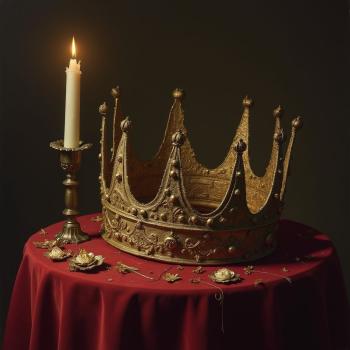Last weekend my wife and I attended a young adult Bible study at our new church. We recently moved back to Boston from New York City and, for the first time in all of our moves (and there have been plenty) we found a church on our first try. There was no church shopping or denomination hopping. We went straight for the nearest Episcopal church, St. James' Church in Cambridge.
We had been flirting with the Episcopal Church for years. First, when we were newly married we joined many of our friends, fellow Gordon College graduates, at the local parish, Christ Church in South Hamilton. Upon moving to New York City, however, we had to start from scratch. Some close friends recommended Redeemer Presbyterian Church. We had never heard of NYC's most popular church (at least in evangelical circles), and naively assumed that since our friends were close with the Kellers, it would be a small community that we'd easily engage. We were wrong. In the end, Redeemer was too big, too corporate, too Presbyterian.
We tried a few other places, a Redeemer plant in the Village, another church on the Upper West Side, until finally we found our church home right in our own neighborhood, Grace Van Vorst, an Episcopal church in downtown Jersey City. There, as at our new church home in Cambridge, we met plenty of young people that shared our story—tentative converts from evangelical churches, disillusioned by the way their religious identity had been hijacked by the political right.
This is a familiar narrative that doesn't bear retelling here. What is significant, however, is the way it seems to be happening again. That is, those of us who left evangelicalism—and, according to recent Pew surveys there are plenty of us—find ourselves the objects of a process to be reabsorbed into evangelicalism. It's been happening since at least 2007, in the run-up to the presidential election in 2008. Faced with the apparent splintering of young people from the evangelicalism of our parents' generations, attempts were made to reassign us as members of a "new evangelicalism." The problem was, we didn't call ourselves evangelicals.
But the name stuck. So much so that just last week, the New York Times' "Campaign Stops" blog ran a piece entitled "The New Evangelicals" by Marcia Pally, author of a book by the same name. The post offers a quick blast of history, referencing as I have here, the change that everyone noted in 2008. Names like Richard Cizik and Scot McKnight are dropped, the "Evangelical Manifesto" is embedded, and the same old story is told, at the expense of the real story of full flight from evangelicalism.
A commenter on the post notes this in his response. He identifies a tendency at the Times, and I'd argue that it exists in the media in general, to polarize Americans as either "secular elite," presumably Times readers, and Christians, "Evangelicals (recovering rednecks) and Catholics (white ethnic and brown proles)." He writes, "Guess what: some of us educated, urban-coastal, upper middle class knowledge workers are Christians: liberal, non-evangelical, non-Catholic Christians."
The conflict rests in how you choose to interpret the numbers. Those who try to hold onto the departing, left-leaning youth have to ignore some convincing data, as my colleague at Patrol Alisa Harris, pointed out earlier this year. Harris highlights the declining evangelical retention rate, as observed by Robert D. Putnam and David E. Campbell in their study of American religious shifts, American Grace. She observes that rather than "stick with the extremely uncomfortable identity of evangelical liberal . . . Evidence suggests [young people] switch churches."
Certainly there are young evangelicals who like to refer to themselves as new evangelicals, and who defend the label tooth and nail. But besides their relative youth, there just isn't a lot that is "new" about them. Perhaps it is just a matter of semantics, but it turns out that, to many of us, semantics are actually pretty important. I, like many of my peers, find it loathsome to have to qualify my Christian faith by constantly informing inquirers that I am not like "those" evangelicals. When I identify as Episcopal or Anglican, there's a lot less explaining necessary.
At the Bible study that my wife and I attended last weekend, the group reflected on gifts from God. In the midst of the discussion, one of the attendees, a new parishioner like us, noted that she was in the process of transitioning away from the faith tradition of her youth, and into one that she felt more fully aligned with God's plan for his kingdom on earth. The gift from God she identified was us, a community of peers on a similar journey.
12/15/2011 5:00:00 AM





